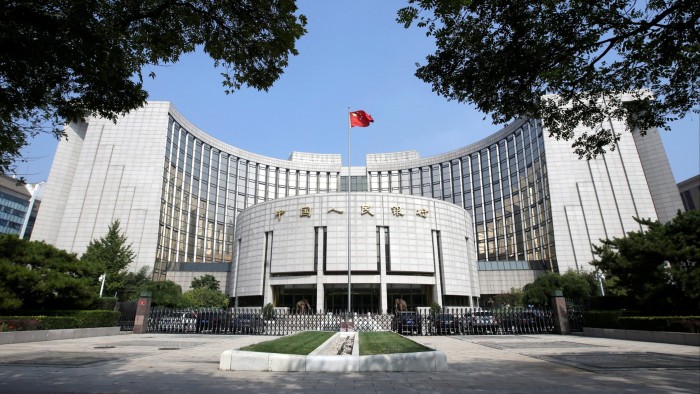Unlock the Editor’s Digest for free
Roula Khalaf, Editor of the FT, selects her favourite stories in this weekly newsletter.
China’s central bank has asked European financial institutions for advice on dealing with the effects of low interest rates, as the world’s second-largest economy risks slipping into a prolonged period of low inflation.
The People’s Bank of China has sent “ad hoc” requests to at least two European banks this year for insights on the impact of low to zero interest rates on the banking systems in their home countries, according to people familiar with the requests.
The move suggests the Chinese central bank is concerned about a multiyear deflationary environment, which would threaten bank profits and financial stability — similar to what many European countries experienced last decade.
“This kind of request is precautionary,” said one of the people who received a request from the PBoC. “You need to know how to manage [zero rates].”
Chinese policymakers have unleashed multiple rate cuts over the past year, slashing the benchmark policy rate to 1.4 per cent from 1.8 per cent and the one-year benchmark lending rate by 0.5 percentage points to 3 per cent in an effort to stimulate sluggish domestic demand amid slowing economic growth.
“From the recent moves by the PBoC you can see that its mindset is changing,” said Richard Xu, an analyst at Morgan Stanley, adding that the central bank was “[paying] attention to the negative impact of low rates”.
Some policy advisers to the PBoC are concerned that further cuts would have a diminishing effect in boosting credit demand or consumption. The Chinese economy has been teetering on the edge of a deflationary spiral, with the inflation rate in negative territory for the past four months.
The PBoC’s readout of its second quarter monetary policy meeting, released last week, said the Chinese economy “still faces difficulties and challenges, such as insufficient domestic demand, persistent low prices, and various hidden risks”.
The central bank also hinted at a less aggressive rate cutting stance, tweaking the phrasing of its policy outlook from “cutting [the] reserve requirement ratio and rates at appropriate time” to “implement the policy with more flexibility in the intensity and pace”. Analysts understood the change to suggest lower chances of a rate cut in the near term.
The people familiar with the PBoC’s messages described them as open-ended requests for information about how governments and banks navigated low interest rates to avoid damaging their financial systems and broader economies.
European countries underwent a decade of extremely low interest rates between the 2008 financial crisis and the coronavirus pandemic, hitting bank profitability.
The PBoC request highlights concern among some economists of a long period of insufficient domestic demand, similar to the ‘lost decades’ in Japan, which endured an extended period of stagnating living standards and weak growth for more than two decades from the early 1990s.
“It shows they are learning and getting ready,” said an economist at one of the European institutions that received a request.
The person added that PBoC still had some room for manoeuvre, given that China’s benchmark one-year loan prime rate remained at 3 per cent.
Chinese financial authorities have expressed alarm over falling bond yields, warning that regional lenders were exposed to interest rate risks of the kind that preceded the collapse of Silicon Valley Bank in 2023.
China’s 30-year bond yield has dipped from 2.42 per cent to 1.86 per cent in the past year, while the 10-year bond has shed more than 0.5 percentage points to 1.65 per cent.
Market participants have suggested investors seeking safer, higher-yielding assets in expectation of lower economic growth could push bond yields down further. Bond yields move inversely to prices.
One person at a European asset manager said that it had received a request from Chinese state banks and insurers in the first quarter of 2025 about how to mitigate the impact of low rates.
Their response, which included suggestions to increase purchases of higher-risk assets such as equities and lower-fee products such as exchange traded funds, was later briefed to PBoC via the state banks, the person said.
The PBoC declined to respond to a request for comment.
https://www.ft.com/content/49a99725-c35d-4d2d-b4cd-aa594f473696


